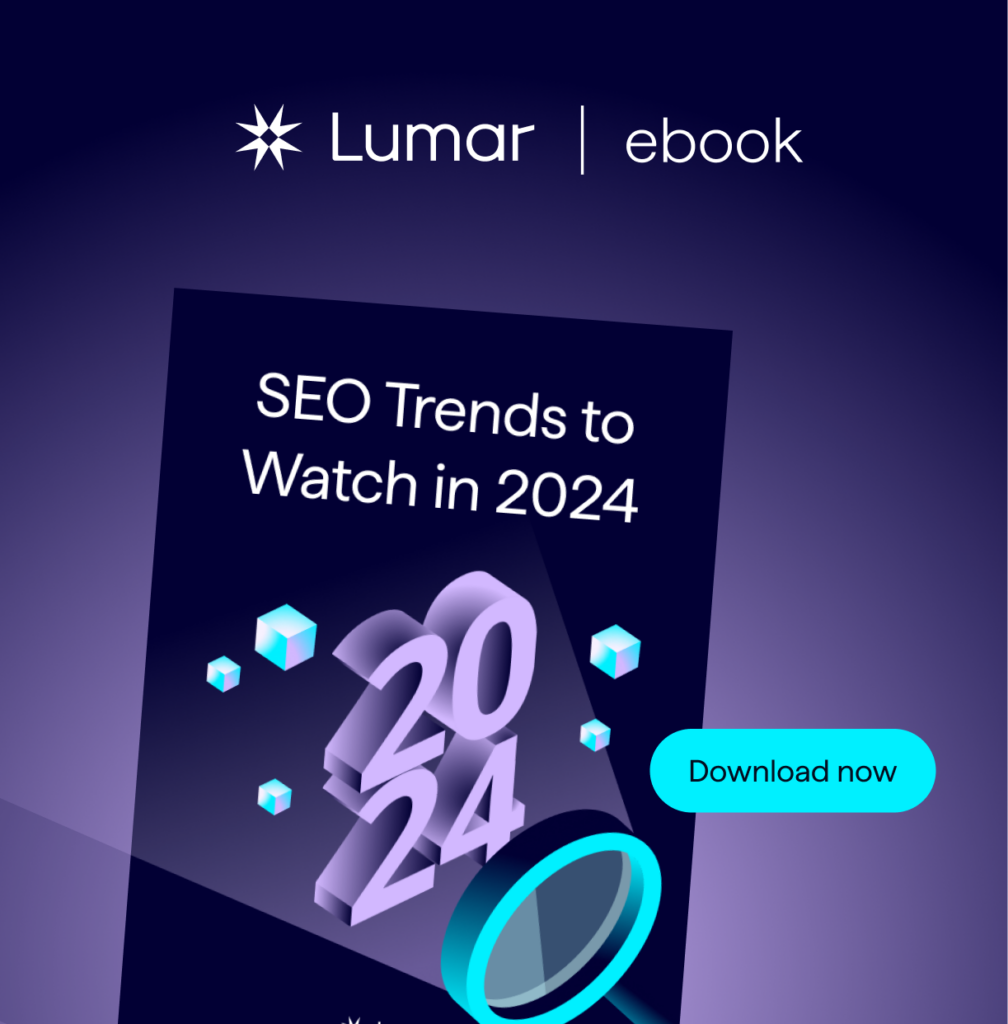Google’s focus on high-quality content really came into the foreground for SEOs last year alongside the search engine’s Helpful Content System and core algorithm updates that aimed to surface more content that demonstrates first-hand experience, expertise, authority, and trustworthiness (E-E-A-T — more on that below!).
This prioritization of human-first content in the SERPs is almost certain to continue throughout 2024 and beyond.
Content quantity has always been less important than content quality but moving forward, if search engines’ algorithms continue in the direction they have been going, this is going to be even more important for website managers who want to ensure they continue to rank well in organic search.
When it comes to creating web content that is poised to rank well in 2024, Senior Technical SEO Chris Steele recommends:
“If you’re not writing for a human being, a person, please stop what you’re doing and do it now. If you’re still in the phase of writing for search positioning or anything like that, then you’re kind of hustling backwards at that point.
This is gonna be super important moving forward… If the core algorithm updates and the helpful content updates that we had this year didn’t convince you that content that targets people – versus [SERP] positioning – matters, I don’t know what will. But, definitely, this is the focus.”

Does anyone actually like AI-generated content? (Does Google?)

“In the most dire scenarios for the impact of generative AI, Google will spend the next year playing algorithmic whack-a-mole with unprecedented volumes of new AI-generated content.”
— Anne Berlin, Senior Technical SEO at Lumar
Notably, the increasing importance of high-quality, human-centered content comes after the widespread adoption of generative AI tools like OpenAI’s ChatGPT — likely in an effort by search engines to combat the flood of poor-quality AI-generated content proliferating on the internet. It should go without saying, but SEO and content teams who utilize AI tools in their content creation will need to take a measured, quality-focused approach. Content quantity has always been less important than content quality — but moving forward, if search engines’ algorithms continue in the direction they have been going, this is going to be even more important for website managers who want to ensure they continue to rank well in organic search.
As Google Search Liason Danny Sullivan has pointed out, Google’s recent content-focused algorithm updates shouldn’t come as a surprise to SEOs; the search engine has long pointed to the importance of high-quality content in its Quality Rater Guidelines, and in public-facing messaging that it’s published for many years now.
![Quote from Google Search Liaison on Twitter/X: "[Google Search] systems are chasing what people like."](https://www.lumar.io/wp-content/uploads/2024/02/Quote-2024-SEO-content-Google-search-systems-chasing-what-people-like-1024x243.png)
Sullivan has also stated that Google’s search systems are chasing what people like. And, broadly speaking, people do not like or trust AI-generated content at the moment — particularly when its origins are purposefully obscured by the publication.
We can see this general public distrust and dislike of AI content in the backlash against major publications’ tentative forays into published AI-generated content in recent months.
You may recall that CNET found errors in more than half of its AI-written stories, according to reporting at The Verge, or the recent PR disaster resulting from Sports Illustrated’s attempt to pass off AI-generated articles as human-written content.

The title of The Hustle’s coverage of the Sports Illustrated content scandal pretty much sums it up: “Another publication accused of serving up AI-generated crap.”

The backlash was enough for Sports Illustrated to delete all of the content in question from their website following critical questions about it from the human journalists at Futurism.
“My belief is that the market will put a premium on people and that will actually have a number of crazy down-stream effects,” said Verge journalist Nilay Patel in a recent episode of the Decoder podcast, discussing the changes we may see in the wake of more AI-generated web content.
With poor public perception of AI-generated content, it’s no wonder that Google has put more emphasis on showing human-first content at the top of the SERPs. In updating its search algorithm, its team is, after all, trying to give users what they like.
Hallucinations & Authenticity
There’s a reason not one, but two dictionaries’ “words of the year” hinted at the challenges posed by AI content last year.

- Cambridge Dictionary’s 2023 word of the year: Hallucinate
- Merriam-Webster Dictionary’s 2023 word of the year: Authentic
The focus Merriam-Webster has put on authenticity closely echoes the expertise, experience, authority, and trustworthiness (E-E-A-T) Google prescribes in its Search Quality Raters Guidelines as criteria for judging whether or not a website’s content should be considered high-quality, and thus, whether or not this content is worthy of ranking highly in the SERPs.
“There are only a few ways to get ahead [in SEO],” said Ahmad Abusamak, SEO Manager at Bank of America, on the Voices of Search podcast, “And the best one is going to be authority and authenticity in a particular space.”
So, let’s take a look at some of the recent Google updates that are pushing human-first, high-quality content to the top of SEOs’ minds in 2024. These include:
- The continued expansion of Google’s Helpful Content System, a core part of its current ranking algorithm
- The addition of ‘experience’ to Google’s E-E-A-T acronym in its Quality Rater Guidelines
- The announcement that Google intends to surface more ‘hidden gems’ from first-person-centric forum and social media posts in the SERPs
Google’s “Helpful Content Update”: Why Site-Wide Content Quality Matters for SEO
Google’s relatively new “Helpful Content Update” (HCU), known officially as its Helpful Content System, was first introduced back in 2022 and helps the search engine identify and show more original, authoritative, and trustworthy content to users while deprioritizing low-quality content in its search results.
With an influx of new AI-powered ‘writing’ tools in recent years, the introduction of this new search system likely sought to combat the potential flood of poor-quality, artificially generated content proliferating on websites around the world and direct more users to the content that would actually help and inform them.
According to Google’s own documentation on the HCU, this system looks at site-wide signals of content quality — which means the ranking system is considering factors that go beyond a single page or blog post when determining how to rank that page:
“The system generates a site-wide signal that we consider among many other signals for use in Google Search (which includes Discover). The system automatically identifies content that seems to have little value, low-added value or is otherwise not particularly helpful to people.
Any content—not just unhelpful content—on sites determined to have relatively high amounts of unhelpful content overall is less likely to perform well in Search, assuming there is other content elsewhere from the web that’s better to display. For this reason, removing unhelpful content could help the rankings of your other content.”
[Source: Google Search Central]
![Stylized quote from article about SEO content in 2024. Text reads: "Google's Helpful Content System [Helpful Content Update] looks at SITE WIDE signals of content quality — which means the ranking system is considering factors that go beyond a single page or blog post when determining how to rank that page."](https://www.lumar.io/wp-content/uploads/2024/02/Quote-2024-SEO-content-Google-Helpful-Content-Update-Uses-SITE-WIDE-signals-for-quality-1024x386.png)
Understanding Updates to Google’s “Helpful Content System”
Since launching the Helpful Content System (HCS), Google has continued to improve its related algorithms and guidance, including updates such as:
1) New warnings about hosting third-party content on your website
Google posted a warning to website managers that hosting third-party content on their website or subdomains may impact your site-wide helpful content signals — and a recommendation from Google to noindex third-party content on your site.
Per the new Google Search Central guidance :
“If you host third-party content on your main site or in your subdomains, understand that such content may be included in site-wide signals we generate, such as the helpfulness of content. For this reason, if that content is largely independent of the main site’s purpose or produced without close supervision or the involvement of the primary site, we recommend that it should be blocked from being indexed by Google.”
2) An improved classifier for the Helpful Content System
An ‘improved classifier’ was introduced for Google’s HCS, launched in the September 2023 Helpful Content Update. (The specifics on what precisely has improved within its classifier were not included in the help document.)
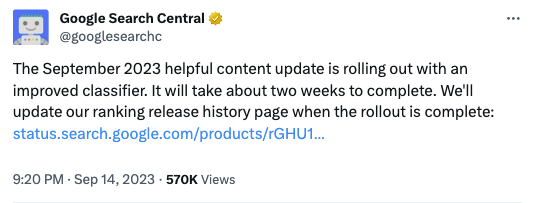
3) A note about removing old content from your site
Google Search Liaison posted a clarification on X/Twitter to note that removing loads of old content from your site will not signal to Google that your content is more ‘fresh’.
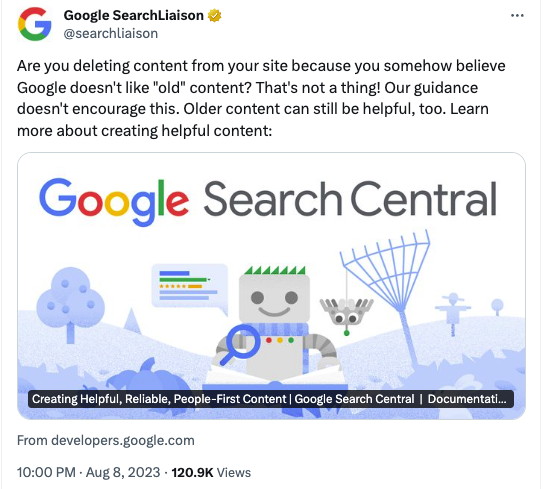
This focus on identifying and promoting higher-quality website content in search results is not a one-time initiative for search engines — Google has long emphasized the importance of useful, truthful, and well-written web content. This is evident, too, in Google’s longstanding Quality Rater Guidelines, which include their “E-A-A-T Guidelines” for evaluating content based on expertise, authority, and trustworthiness (more on that below!).
Per Google Search Central’s initial announcement about the Helpful Content Update:
“Google Search is always working to better connect people to helpful information. To this end, we’re launching what we’re calling the “helpful content update” that’s part of a broader effort to ensure people see more original, helpful content written by people, for people, in search results.”

“Since Google released its Helpful Content update, we’ve seen numerous sites with large amounts of thin, duplicate, low-traffic content lose those pages from the search engine’s index. I expect this phenomenon to continue.
The internet has become too bloated for search engines to crawl, render, and index effectively without stronger limits on resource utilization. This means that sites that invest in improving their ratio of quality content are going to see better indexation speed and coverage.”
— Anne Berlin, Senior Technical SEO, Lumar
E-E-A-T & the Value of Google’s Quality Rater Guidelines in 2024

When Google updated its earlier “E-A-T” guidance in the Quality Raters Guidelines (QRG) to include a second E for “experience” — extending the acronym to E-E-A-T (Experience, Expertise, Authority, and Trustworthiness) — it signaled the continued importance of human-first content for SEO.
As we’ve discussed throughout this article, content quality clearly seems to be top of mind for Google in 2024. And again, this shouldn’t be surprising given the growing concern about poor-quality, AI-generated content flooding the web following the public release of tools like ChatGPT. (In fact, the E-E-A-T update in Google’s Quality Rater Guidelines was implemented just weeks after Open AI’s ChatGPT was first launched to the wider world!)
It is important to note that search rankings are not directly affected by Google’s Quality Rater Guidelines, which were developed to help Google’s human search quality reviewers evaluate and rate Google’s search engine results and drive future improvements in their algorithms. That is to say, not everything mentioned in the QRG is directly integrated into today’s Google search algorithm as individual ranking factors for your website.
However, the QRG can give you a better idea of what kind of content Google wants to prioritize and show more of to its users — and what future search algorithm updates will likely aim to incorporate. This is evidenced by the ‘Hidden Gems’ algorithm update, which prioritizes content that demonstrates first-hand experience, following the E-E-A-T update in the QRG — and the ongoing emphasis Google has placed on its Helpful Content System updates.
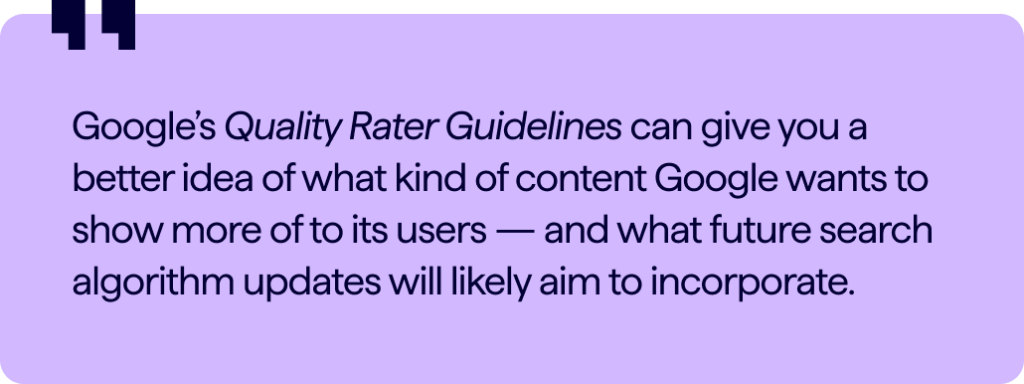

“E-E-A-T (Expertise, Experience, Authoritativeness, and Trustworthiness) was a big talking point in 2023, but I think it’ll become even more important over the next 12 months.
work on becoming a recognizable, authoritative voice within their niche if they hope to maintain those top-position rankings.
AI tools like ChatGPT will come into play here, too. I expect we’ll see a huge amount of AI-generated content being published in 2024, a lot of which will fall short of Google’s content quality guidelines.
Sites that are willing to invest time, money, and resource into producing human-driven content from writers with real-world experience will reap the rewards in the long run.”
— Natalie Stubbs, Senior Technical SEO, Lumar
Based on the updated QRG document, Google’s search quality raters should evaluate whether or not content demonstrates the following factors when determining its quality:
- The page should serve a useful purpose
- Experience, Expertise, Authority, and Trust (E-E-A-T)
- Content quality and quantity
- A description of the website or the creator of the main content
- The reputation of the website or the content creator of the main article
E-E-A-T and the Future of High-Ranking Website Content
In 2024 (and beyond), if you want to create website content that is poised to rank highly in the SERPs, it’s important to consider how your content demonstrates expertise, experience, and trustworthiness — and how it’s building topical authority around the subjects that matter most for your brand. After all, a primary goal of Google and other search engines is to meet their users’ search intent with content that is informative, and, more importantly, accurate.
“There are only a few ways to get ahead [in SEO]. And the best one is going to be authority and authenticity in a particular space.”
— Ahmad Abusamak, SEO Manager at Bank of America, on the Voices of Search podcast
Quick tips for creating better E-E-A-T content:
Good content for SEO today should follow the basic tenets of good journalism.
- Work with writers who have actual subject matter expertise to create helpful content and share first-person experiences. Your website content needs to do more than just mention keywords to rank well in search, it needs to provide actual value.
- Make it easy for users to verify the factual information you publish — include sources, citations, and relevant links to authoritative research reports, studies, and data points in your content.
- Create author bios that highlight why your contributors are qualified to write about the subjects they cover.
- Build out topical authority for your website by creating and organizing your high-quality content around core topics that are relevant to your brand
Further reading on E-E-A-T:
- “E-E-A-T: Why Experience Matters in Website Content” (Lumar blog)
- “How our Quality Raters make Search results better” (Google Support)
- The Full Search Quality Evaluator Guidelines (Google)
- How to Build Topical Authority for Your Website (Lumar blog)
- SEO Trends: Be Smart About Artificial Intelligence & AI-Generated Content (Lumar blog)
Uncovering “Hidden Gems” in Google Search
In late 2023, Google’s plethora of core updates included ranking system changes aimed at surfacing more content relating to people’s first-hand experiences — written by actual humans — in the form of boosting more social media, blog, and forum posts.
As Google wrote in its Keyword blog in November 2023:
“One of the best ways to get information that works for your specific needs is to find someone with firsthand experience. We’re introducing a few updates to make it easier for people to find and share their insights with others on Search.
… As part of this work, we’ve also rolled out a series of ranking improvements to show more first-person perspectives in results, so it’s easier to find this content across Search.”
This announcement followed a note made months earlier by Google’s Danny Sullivan on the Google Search Liason Twitter account:
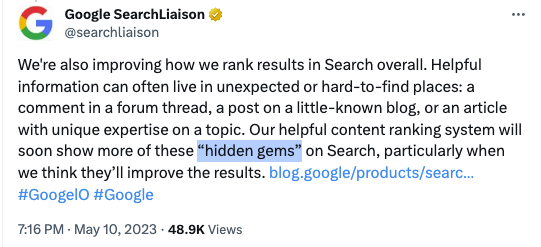

“I think the interesting thing for me has been in the last couple of months. To be fair, [I think Google’s algorithm] has massively over-indexed towards Reddit and [forum content] — especially Reddit.
But at the end of the day, if I’ve got a very specific question, quite often, Reddit is where I find the answer, right? And Reddit is where I find the answer without it being written in a 500 word blog post designed to try and rank first for a keyword, you know what I mean?”
— Chris Spann, Senior Technical SEO at Lumar
This all makes sense as a new roll-out in Google’s core search algorithm, as the search giant has flagged for months that they are increasingly valuing content that can demonstrate author experience. This was big news for SEOs last year, with the update to Google’s Quality Rater Guidelines (QRG) that turned its former “EAT” acronym into “EEAT” to add experience as a key criterion for content quality.

“I think it was one of the recent algorithm updates (August, September, October, take your pick…) where sites like Reddit and Quora really saw a visibility increase.
That’s really interesting because it does show that shift towards content that is written by people with actual experience…
I know that Google relaxed some of the phrasing that they’ve used around content that’s generated by AI and kind of moved away from being completely against it, saying more that, as long as the content is good quality, it should still rank and be visible. But obviously, [Google’s simultaneous] focus on [an author] having the experience to share content that is authentic — is seemingly very important.”
– Natalie Stubbs, Senior SEO at Lumar
What’s more, Google’s ongoing focus on improving its Helpful Content System serves as a further signal to SEOs that experience-based, human-first content will continue to dominate search algorithm changes in the future.
Further Reading on Google’s “Hidden Gems” Announcement:
- “New ways to find just what you need on Search” (Google, The Keyword)
- “Google Search ranking improvement aims to surface hidden gems” (Barry Schwartz, Search Engine Land)
- “Learn from others’ experiences with more perspectives on Search” (Google, The Keyword)
What does Google’s focus on human-first content mean for teams using ChatGPT & generative AI?
The bar has been raised for content production in an age where poor quality, AI-generated content is a dime a dozen. You’ll need better content, not just more content, to rank well in the future.
Increasingly, for SEO, website content should follow the basic tenets of good journalism. This means an increased focus on fact-checking (especially if you’ve used an AI tool to generate parts of your content), citing credible sources, incorporating more first-person anecdotes from industry experts, and ensuring your editorial team is working toward a high standard. The websites likely to take the biggest SERP hits (not to mention reputation hits) due to their use of AI-generated content are the ones whose content managers simply copy and paste AI-produced content and publish it as-is. Good editors are more important than ever.
All this focus on human-first content doesn’t mean that you cannot use AI tools in your content creation at all. But they should be used as just that — supplemental tools — not as a replacement for high-quality writers, editors, and subject matter experts. This much is clear from Google’s recent emphasis on promoting website content that can demonstrate first-hand author experience and the focus on expertise, trustworthiness, and authority in Google’s Quality Raters Guidelines.
“I think the AI thing is interesting,” says Chris Spann, senior technical SEO at Lumar, “When I was working on travel sites, we were trying to find a way to add content to pages — human readable, content content, if you know what I mean — but what we found was, if you’ve got 50,000 hotels in your database, there are only so many ways you can say it’s one mile from the beach. So content like that, by all means, offload onto AI.”
“AI, from my experience anyway, is useful when you use it to add to human-written things,” he explains, “It’s a tool more than anything else.”
For SEOs taking a forward-looking approach to ranking their websites, aligning your web content strategy with the signals Google has long been sending around the importance of content quality simply makes sense.
When search engines flag the importance of content quality, you can expect that future algorithm updates will aim to address this in the ranking systems — simply look at Google’s introduction of its Helpful Content System and its recent ‘hidden gems’ update, both of which followed updated guidance around content quality in the Search Quality Rater Guidelines.

Try Lumar for Technical SEO
For businesses looking to improve technical SEO and boost their websites’ overall technical health and search performance, Lumar’s robust technical SEO platform provides a full suite of tech SEO analytics, website accessibility reports, and connected SEO workflow tools.
You can book a Lumar demo here to see the latest features in action and get a customized platform package to suit your unique needs.


